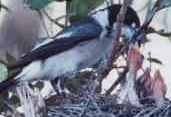Watch the Fragile Day video and help the Gulf Oil Spill Rescue
The unimaginable Gulf Oil Spill has left us all with an intense combination of emotions, from sadness to anger to helplessness. How could this happen? And now that the leak has been stopped, what can we do as individuals to help fix this horrific environmental disaster?
How could this happen? And now that the leak has been stopped, what can we do as individuals to help fix this horrific environmental disaster?
Musical duo Wilderland answers the call by releasing their new song "Fragile Day" with 100% of all proceeds benefiting the habitat affected by this tragedy.
Click here to watch the Fragile Day video and download the song Heralding from the mountains of Ashland, Oregon, Wilderland features singer-songwriters Scott Blum and Kat Sanchez. A veteran from the music industry, Blum (multimedia producer for Peter Gabriel, Soundgarden and many others) balances the exquisite vocal stylings of Sanchez who had been a member of a wide range of local bands most of her life.
Also touched by the environmental tragedy, music industry superstars Toby Wright (Grammy award winning producer of Alice in Chains, Korn, 3 Doors Down, etc.) and Stephen Marcussen (mastering engineer for the Rolling Stones, Stevie Wonder, Seal, Cher, Paul McCartney, etc.) both contributed their expertise to this worthwhile project. You can download two versions of "Fragile Day" by Wilderland with 100% of the proceeds donated to three important charities helping the habitat affected by the Gulf Oil Spill Tragedy. These organizations include The Gulf Restoration Network, EarthShare and the WILD Foundation. Visit www.FragileDay.com to watch the emotionally powerful video and download the song to support this worthy cause. Thank you for helping.
Warmest Regards
Gitie

 del.icio.us
del.icio.us Digg
Digg Facebook
Facebook Google
Google Google+
Google+ LinkedIn
LinkedIn MySpace
MySpace Ping This!
Ping This! SlashDot
SlashDot StumbleUpon
StumbleUpon Twitter
Twitter Yahoo
Yahoo




Comments
We all know that our Earth is
We all know that our Earth is facing climate change. Global warming is one of the effects of climate change. We might think that this may not affect us. Global warming has already created lots of environmental problem. Probably we've been shock about the oil spill that happened in the Gulf of Mexico. That incident was really a threat to the environment for aquatic organisms are greatly affected by it. I just hope that this won't happen again in the future.
Climate change
Hi KyaY,
Unfortunately we have been seriously lied to by governments, politicians, a small cadre of climate scientists, and big business interests. Warmth is good for the earth and always has been. The medieval warm period was a few degrees hotter than now and live flourished. 9,100 years out of the last 10,000 have been hotter than now. The Holocene interglacial is slowly falling back down towards the next ice age. It might not happen for 10,000 years, but it could start tomorrow, we just don't know enough to predict it.
On the other hand, carbon dioxide is plant food. You and I, every animal and plant, is 93% CO2 and water. At the depths of the last ice age the CO2 concentration in the atmosphere dropped to within a whisker of the value at which photosynthesis stops and 95% of all plants would die - followed by almost every animal including us.
The idea that CO2 is dangerous is fostered for political and financial reasons. All the scientists who send out alarms get research grants for "studying" "the problem". If the gov't sets up a carbon trading scheme, wealthy financiers will make an absolute killing trading a non-existent quantity: NOT emitting CO2. It is a scammer's wildest dream. In Europe 90% of all trades were found to be fraudulent. That is all money coming out of our pockets.
Sadly the demonisation of the essential trace gas, carbon dioxide, has been mixed in with all kinds of genuine pollutants (sulphur dioxide, carbon monoxide, solid (black) carbon (soot), etc.). So when people talk about "pollution" we don't know if they refer to real pollution or to the beneficial emission of life-giving carbon dioxide. Over 30 years, industrial emissions of CO2 have added 8% to the biomass of the planet. That's food for the poor, for animals, for all of us. Roughly 300 million human lives saved and countless animals too.
I have some explanations of the fallacy of the global warming theory here and here.